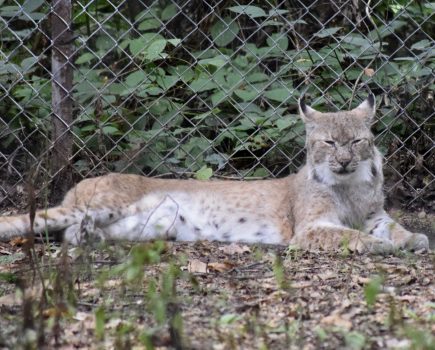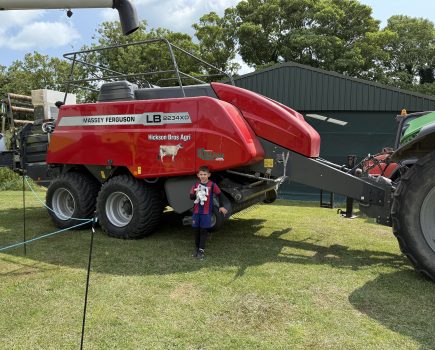If you’ve cut grass for hay or you’re in the thick of harvest, you’re probably hoping the rain holds off. But if, like me, you’re out checking stock and surveying the scorched pasture they’re surviving on, you’re probably wishing the skies would open soon.
We’ve cut our usual acreage of grass and it’s yielded less than half the normal number of bales. The weather will ultimately decide whether or not we will have enough forage to see our animals through the winter. I’m holding on to optimism, hoping nature will balance itself out and keep all of us farmers going in our role as food producers.
I hear supermarkets aren’t always sympathetic when their suppliers fall short due to poor growing conditions. What we want and what we get can vary enormously; a truth usually learned young, though for some this concept is hard to grasp. Whether we like it or not, reality is unescapable, in farming, as in life. We all have to live with the consequences of the weather.
The forecast looked fine and, since Nigel is such a strong advocate for Groundswell, I decided this year I’d finally give it a go, including two nights camping on site. Recently I have become less enthusiastic about agricultural shows. While they have grown in size, I feel they have lost some of their connection to the land and real farming, replaced instead by glitz and commercialism. But Groundswell, billed as The Regenerative Agriculture Festival, turned out to be exactly what I’d been missing – and I loved it.
There was a genuinely friendly atmosphere and a refreshing, positive attitude toward farming. So much information was shared in thought-provoking talks, with space for questions and open discussion. Choosing which sessions to attend was a challenge; they all sounded fascinating. The trade stands were properly agricultural and there were machinery demos (though I ran out of time to see them). The food and drink on offer was excellent, and the clean toilets and hot showers were an unexpected bonus. Happy days.
We spent most of the journey home (which took far longer than it should have, thanks to the Dartford bridge closure) deep in conversation, dissecting the talks and discussing regenerative practices, politics, and food production and its link to health.
Gabe Brown, author of Dirt to Soil, was a standout speaker, inspiring and grounded. He encouraged everyone to begin their regenerative journey with practical steps and by observing nature. I particularly applauded his blunt dismissal of bureaucracy, tick-box culture and subsidy-dependence. His enthusiasm was infectious and his data-backed arguments compelling.
In contrast, Steve Reed’s talk left me completely cold. It felt like pure rhetoric; all about how generous the Labour government was being towards farmers. He told us that, with 15 years of business experience, he understood the need for profit. But it was clear he had little grasp of what it takes to run a farm; the practicalities, the land or the nature of food production. Unsurprisingly, he didn’t stay to answer questions.
The panel discussion Inside the Room: Can British Farming Be Saved?, featuring Henry Dimbleby, Justin King and George Eustice, offered valuable insights. If it’s on the Groundswell YouTube channel, it’s well worth a watch.
My eldest daughter, a healthcare professional, and my youngest, a senior commercial manager for a grower, attended Measuring Food Quality, Nutrition and Health. Dr. David Unwin advocated prescribing regenerative food to improve human health. Apparently, he claimed it’s better to eat bacon and eggs for breakfast than cereal, which is often packed with sugar, even bran flakes, which surprised me. This news delighted my other half, though he cheekily remarked that I’d now have to get up ten minutes earlier to cook breakfast. I told him he was living dangerously.
Exercise is also essential for good health. When I retired from nursing 11 years ago, I awarded myself a springer spaniel, Tilley, so I could go beating, in case farming didn’t keep me active enough.
Tilley is a strong character, full of mischief and utterly stubborn. She loves pottering about the farm. One spring morning, I went to let the chickens out and found an egg in their water bucket. I was puzzling over how it got there when Tilley turned up, looking like someone had cracked an egg over her head. I was stunned, until I realised it wasn’t egg but colostrum. She’d clearly been nosing about in the calving shed. She completely ignored my muttered insults and carried on in her usual brisk, no-nonsense way.
They say sleep is vital for health, too. In our house, the rule is: collies in the kennels, spaniels downstairs and us upstairs. But Tilley believes she should be promoted. One night during lambing and calving season, when we were both utterly exhausted, we inadvertently failed to latch the door properly. Tilley is an opportunist. Once the lights were out, we heard the soft pad of paws, heavy breathing and a tail thumping with excitement. Neither of us had the strength to move.
At first, she lay on the floor beside the bed. Then we felt her settle across our feet. Eventually, I became aware of gentle snoring from a head now sharing my pillow.
Out of the darkness, a voice said, “You’re not the best bed partner.” After nearly 50 years of marriage, I thought that feedback was a bit late coming, I fervently hoped the comment was aimed at the dog.
Eventually, I found the energy to take her downstairs and explain (again) that our home has boundaries – and hers was the downstairs. I made a cup of tea and went back to bed, hoping for peace, at least until morning.
Recently we asked a family member to check the cattle on the marsh. In hot, fly-infested weather, cattle tend to group together in a tight bunch, which makes accurate counting difficult. They returned in no time, announcing they’d put a drone up, taken pictures and would count cattle on the computer later. In the evening, I received a call; they could only count 19 animals when there should be 33. Oh dear.
Luckily, next day the missing cattle were found safe and well, ‘Lookering’ is not always a quick job.
- So many interesting talks to choose between
- Borrowed tent is sucessfully up
- A fun experience
- Tilley, where have you been?
- Delicious fresh produce, can’t beat it.
- These twins drink side by side
- Tip wants to come camping
- Demonstration of using bale unwrappers
- Using water pipes to facilitate driving over electric livestock fencing. Good idea.
- Cattle on the marsh
- Water levels dropping
- Even the marshes are drying out
- These twins drink one in front, one behind!
- These twins drink, one front, one behind!
- George and Angus are generous when feeding hens – happy chickens
For more like this, sign up for the FREE South East Farmer e-newsletter here and receive all the latest farming news, reviews and insight straight to your inbox.






















